Inuit women in Canada’s Arctic suffer ‘unnecessary violence’ from police, legal aid board says
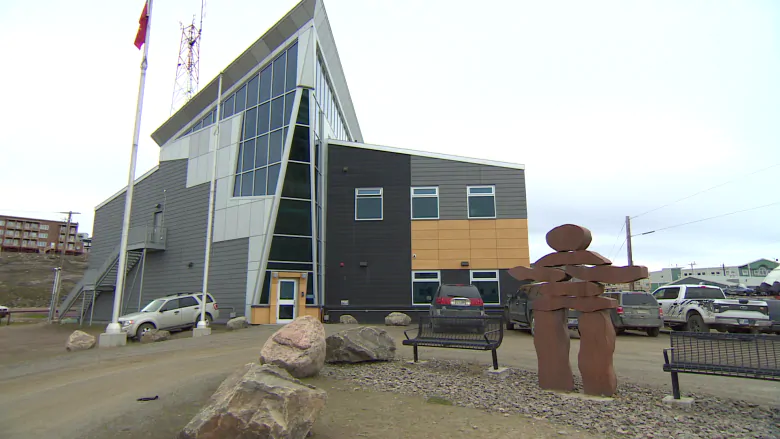
WARNING: Details in this story may be disturbing to some readers.
Inuit in Nunavut, especially women, suffer systemic police abuse, including excessive violence and persistent racism, according to the territory’s legal aid agency.
The Legal Services Board of Nunavut says it has “significant concerns” about the quality of policing and conduct of officers as reported by its Inuit clients in Nunavut’s 25 communities.
The board is calling for a systemic review of policing in Nunavut.
The allegations include “repeated and systematic instances of unnecessary violence,” and a lack of oversight and training specific to Inuit culture.
“There appears to be a particular pattern of poor service when it comes to women in domestic and sexual assault matters,” the board’s CEO, Benson Cowan, wrote in a letter dated June 13, 2019, addressed to the Civilian Review and Complaints Commission for the RCMP (CRCC).
CBC News was provided a copy of the letter and a followup letter, both obtained by a freelance journalist under Access to Information legislation.
The second letter, dated Jan. 23, 2020, describes the “humiliating and degrading” experience of two women strip-searched by RCMP officers in Nunavut.
Both letters call on the commission to initiate a full, systemic review of policing across the territory.
“The systemic nature of such conduct is so pervasive that only a broad review would be effective for understanding the true scope and character of the problem … and in identifying solutions,” Cowan wrote in the first letter from last June.
“It is imperative that some effort is made to improve the quality of the police services provided by the RCMP and their relationship with the communities.”
Trying to better understand concerns: CRCC
Both the RCMP and the CRCC declined CBC’s interview requests for this story.
In a letter to the legal services board in March, the CRCC said it “remained committed to conducting a systemic review of RCMP policing activities in Nunavut.”
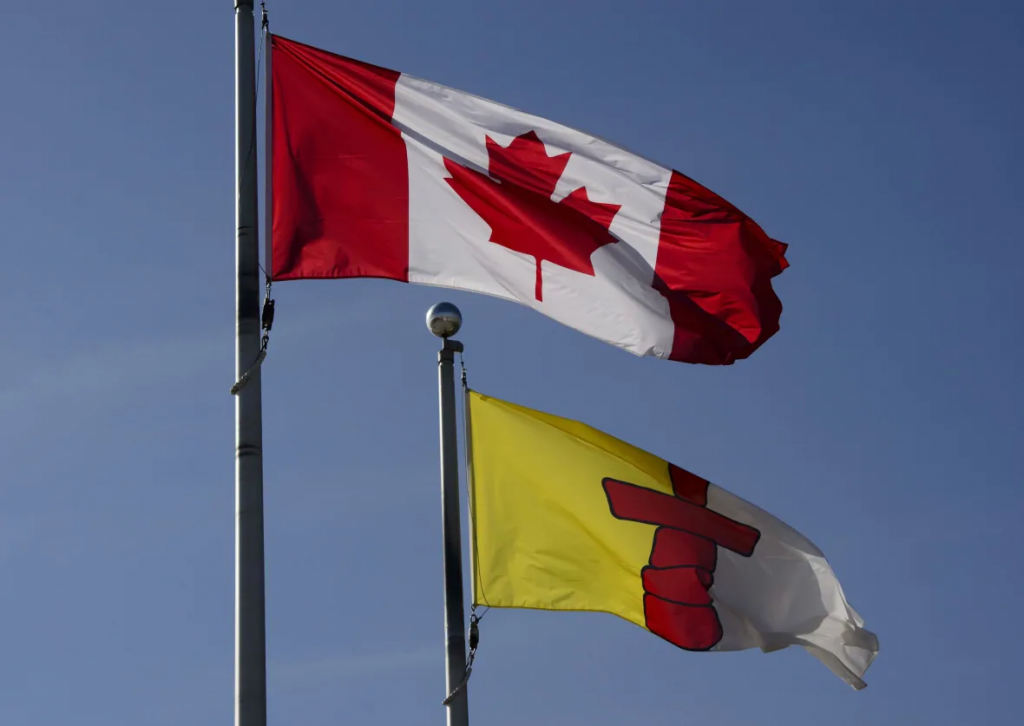
But in an email to CBC News, Cowan said that was the first he’d heard of the commission’s commitment.
“When we met in June [2019], we discussed the options for reviews. But this is the only time they have said they are committed to do so,” Cowan wrote.
In an email to CBC, the CRCC did not confirm it would conduct a systemic review, but did say it began meeting with stakeholders in January 2019.
“While the CRCC continues to work toward identifying specific RCMP activities in Nunavut that could be examined, present travel restrictions have led to the postponement of meetings planned for this spring,” wrote Kate McDerby, director of communications.
The RCMP said in an email to CBC it would be “premature … to discuss the content” of the board’s allegations “until the CRCC has made the decision to launch or not” a systemic investigation.
Allegations from more than 30 cases
The allegations in the Legal Services Board of Nunavut’s letters include 32 cases from across the territory. The board says the cases are from the past few years and cover “a small fraction of the occurrences” but “provide an accurate picture of the nature of the issues with RCMP policing across Nunavut.”
The allegations are listed under eight categories:
- Inadequate response to domestic violence and sexual assault.
- Handling of female victims and accused.
- Strip-searching of women in Nunavut.
- Systemic violence.
- Warrantless entries into homes.
- Failure to provide medical attention.
- Racism and cultural insensitivity.
In one case, the board says, a young Inuk woman attended a detachment to lodge a sexual assault complaint.
“Instead of taking her statement, the RCMP charged her with breaching her own [parole] conditions,” the board wrote.
Women who called in fear of domestic violence and sexual assault “often reported” they had to wait “excessive amounts of time … that the matter was not a sufficient emergency … or … told to stop calling the police,” one letter said.
In another case, the board says, police attended a sexual assault involving full penetration in progress. Police arrested the accused while the victim was allegedly “left unclothed” and “was not offered any assistance including not taken to the health centre.”
In some cases, the complainants who called for help were themselves arrested and charged, some after an illegal search of their home, the board says.
Degrading strip searches
Other cases described what the board says were illegal and degrading strip searches.
In one instance, a prisoner alleged she was pinned to the cell floor and forcibly stripped by three male officers.
“Eventually she crawled to the cell door and passed out naked in the fetal position,” the letter says.
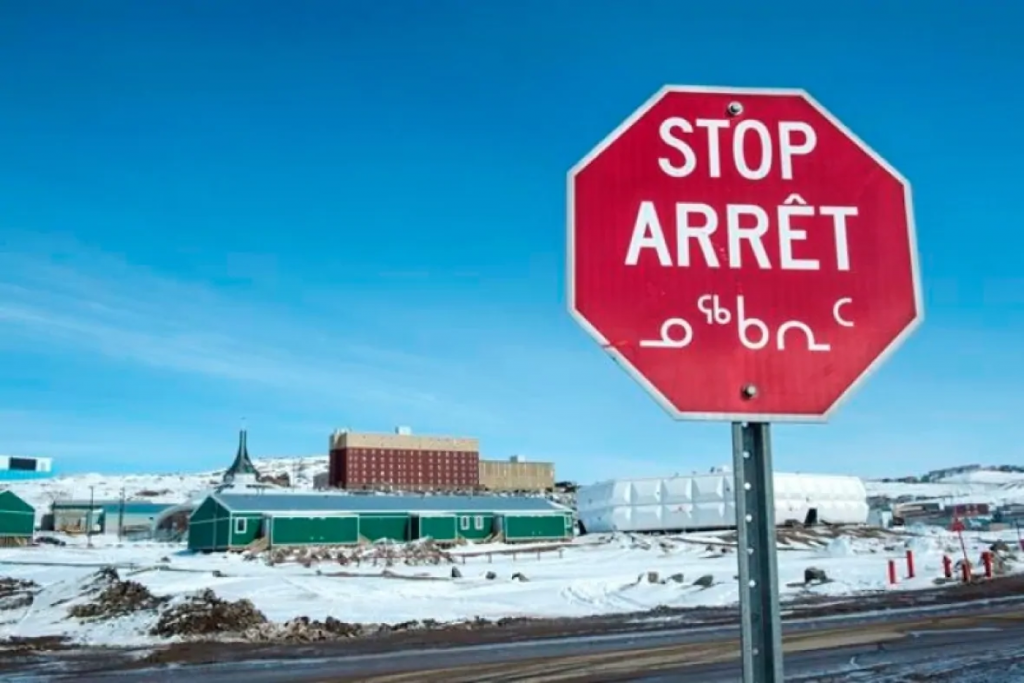
In another case, a male RCMP member forcibly removed the underwear of a 19-year-old woman in a cell, the Legal Services Board alleges.
According to information from one woman’s lawyer, provided to CBC News by a freelance journalist who now works for the broadcaster, the woman was strip-searched and tied naked to a restraint chair for two hours.
The Supreme Court of Canada, in a landmark 2001 decision, said strip searches are inherently degrading and humiliating. Officers must take extra care to ensure they are done appropriately and in line with Canada’s Charter of Rights and Freedoms.
That includes ensuring officers involved in the strip search are of the same gender as the prisoner.
Paul McKenna, an expert in good policing practices with more than 30 years of experience, told CBC News illegal strip searches are an issue across the country.
“It’s not a show — it’s a process and procedure,” he said. “If we’re looking at trying to maintain human dignity, there’s a clear exclusion of different-sex officers on the scene” for a strip search.
The CRCC told the CBC it was finalizing its report on a national review of strip searches, a recommendation that came out of a 2017 investigation of policing in northern B.C.
‘Racialized violence is a genocide’
Other cases cited in the board’s letters described allegations of excessive force.
In one case, a male officer allegedly grabbed a female prisoner by the head and pushed her to the ground with such force he appeared to be left with some of the woman’s hair in his hands.
The legal services board also references three coroner inquests into police-related deaths in Nunavut, citing the fact that Nunavut’s rate of police-related deaths since 1999 is nine times higher than Ontario’s.
The recommendations from those inquests “for the most part, have been ignored,” Cowan wrote.
Many of the allegations made by the board are echoed in the Pauktuutit Inuit Women’s Association report, Addressing Gendered Violence Against Inuit Women, released in January.
“Gendered violence against Inuit women is a problem of massive proportions. Women in Nunavut are the victims of violent crime at a rate more than 13 times higher than the rate for women in Canada as a whole,” the report says.
The rate of police-reported family violence against women in Nunavut is the highest in Canada — 11 times higher than the national average, the report says.
Women interviewed for the report complained of slow police response times, and said they have a lack of faith and trust in policing.
The countrywide mistreatment of Indigenous women by various institutions and levels of government is rooted in Canada’s colonial history, the Pauktuutit report says.
“As the National Inquiry on Missing and Murdered Indigenous Women and Girls has emphasized, this gendered and racialized violence is a genocide that is rooted in systemic factors woven into the fabric of Canadian society.”
Where to get help:
If you’ve experienced trauma and need to talk about it, find some resources below.
- Nunavut Kamatsiaqtut Help Line — 1-800-265-3333
- Embrace Life Council
- Kids Help Phone — 1-800-668-6868 or live chat counselling online
- Hope for Wellness Help Line — 1-855-242-3310
- Canada Suicide Prevention Service
- Toll-free 1-833-456-4566
- Text: 45645
- Chat: crisisservicescanada.ca
- In French: Association québécoise de prévention du suicide — 1-866-APPELLE (1-866-277-3553)
- Canadian Association for Suicide Prevention
- Indian Residential School Resolution Health Support Program, Northern Region — 1-800-464-8106
Related stories from around the North:
Canada: Man in violent Canadian Arctic arrest video wants officer charged, minister says he’s ‘outraged’, CBC News
Finland: Police response times up to an hour slower in Arctic Finland, Yle News
Russia: Police crackdown on Putin opponent’s offices in Arctic Russia, The Independent Barents Observer
Sweden: Film exploring racism against Sami wins big at Swedish film awards, Radio Sweden
United States: Lack of village police leads to hiring cops with criminal records in Alaska: Anchorage Daily News, Alaska Public Media

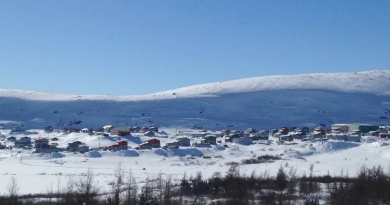
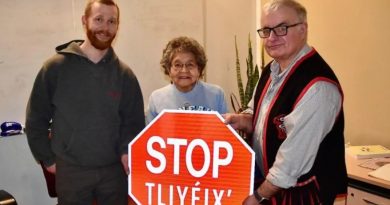
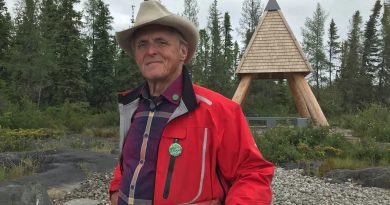
Thank you for your earnest efforts in conjunction with indigenous women of the Far North and current policing conditions and areas of disgrace in Canada. Without this concern, no change or progress can ever happen. Please continue to exemplify the Voice of the True North Strong and Free.